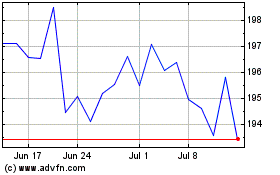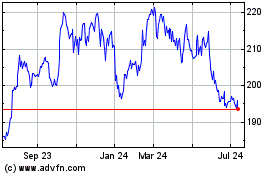SEC Weighs Proposal To Tag High-Frequency Trades - Sources
April 06 2010 - 12:54PM
Dow Jones News
U.S. regulators are moving toward a new rule that would tag
transactions by high-frequency trading firms to improve oversight
of their burgeoning activity, according to people familiar with the
matter.
The plan would see the Securities and Exchange Commission give
high-frequency firms unique identifiers, allowing the agency to
keep closer tabs on traders that are not registered market-makers
or broker-dealers.
The SEC and other global regulators are intensifying scrutiny of
computer-driven trading, which has expanded rapidly and is
estimated to account for two-thirds of daily U.S. stock volume. It
is also a key source of liquidity for listed derivatives
markets.
The agency is undertaking a cost-benefit analysis on tagging to
high-frequency firms' trades, and is expected to move forward with
a proposal in the near future, according to several people familiar
with the process.
The move would make it simpler for regulators to track their
activity, avoiding the need to follow lengthy audit trails from
exchanges.
"The SEC can get any data they want, period, but right now it's
kind of cumbersome because they have to go through the clearing
firm," said one securities lawyer who had discussed the matter with
SEC officials. "This would make it more automated."
High-frequency trading is a catch-all term that incorporates
business from large broker-dealers and smaller proprietary firms.
It isn't clear which traders and transactions would fall under the
SEC tracking scheme.
However, the tagged trading data released a day after
transactions were executed, would be available only to regulators,
according to persons familiar with the matter.
While smaller firms or participants may resist such a rule amid
fears their strategies could be revealed, most of the largest
high-speed trading firms already report much of their activity
through various channels and would see little reason to object,
market participants said.
"My personal opinion is that it's a reasonable thing to do, at
some level," said a senior official at one proprietary trading
shop.
The broad push by regulators to improve market transparency and
reduce systemic risk includes an array of changes to transaction
reporting.
The SEC is considering a raft of new rules aimed at the rapidly
changing makeup of U.S. securities and options markets, now
dominated by electronic trading and dispersed across a range of
exchanges and other trading venues.
The agency is eyeing reporting requirements that would provide
more transparency into the trading on so-called dark pools, private
electronic platforms where large blocks of stock are traded
anonymously.
The SEC also has proposed to ban "naked access" for high-speed
traders, which allows firms to buy and sell stocks on exchanges
using a broker's computer code without authorities knowing who is
making the trades.
A move to track the activity of fast-moving market participants
has been expected following calls by Sen. Ted Kaufman, a vocal
critic of high-frequency trading, for the SEC to take a closer look
at the practice in U.S. markets.
-By Jacob Bunge, Dow Jones Newswires; (312) 750 4117;
jacob.bunge@dowjones.com
CME (NASDAQ:CME)
Historical Stock Chart
From Jun 2024 to Jul 2024

CME (NASDAQ:CME)
Historical Stock Chart
From Jul 2023 to Jul 2024
